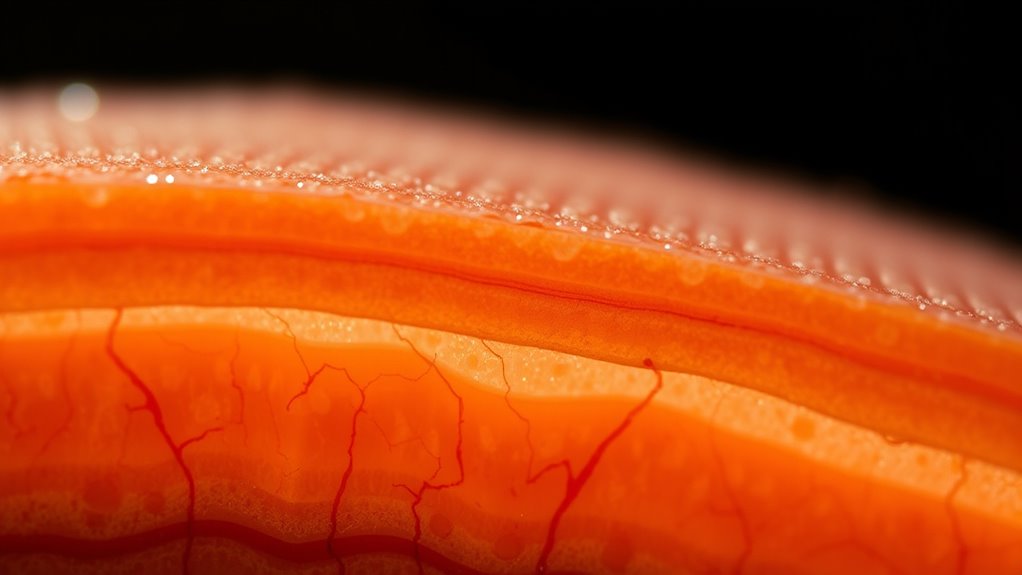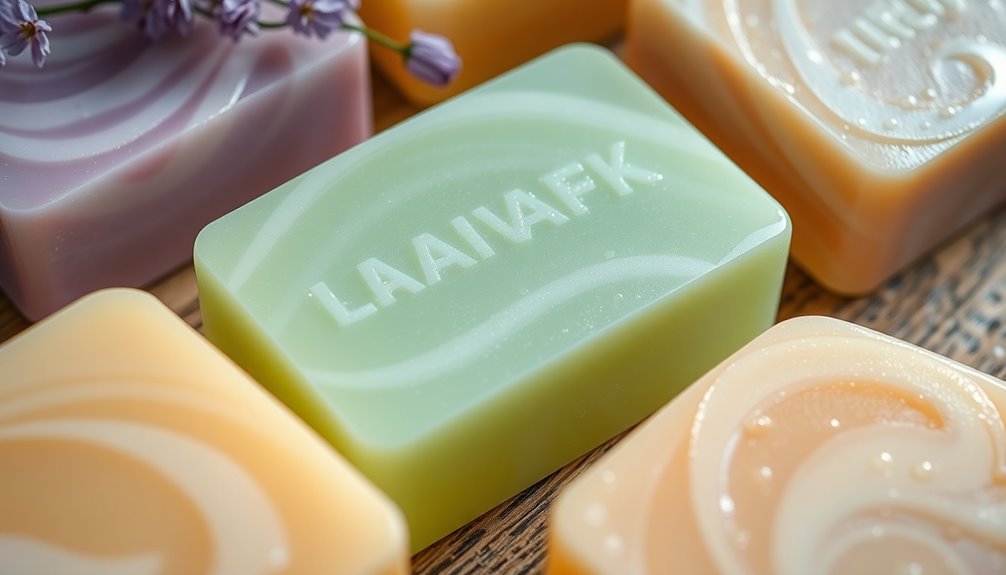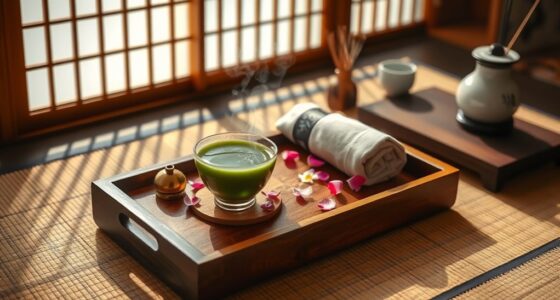Your skin barrier is your first line of defense, composed of lipids, proteins, and dead skin cells that protect against environmental damage and bacteria. It helps lock in moisture, keeping your skin hydrated, smooth, and resilient. Maintaining its ideal pH (around 4.5–5.5) is essential for its function, as imbalances can cause dryness or sensitivity. By supporting your barrier through gentle skincare and protection, you can keep your skin healthy—learn more to protect it better.
Key Takeaways
- The skin barrier is composed of lipids, proteins, and dead skin cells, serving as the first defense against environmental damage and bacteria.
- It maintains skin health by locking in moisture and supporting a pH level around 4.5 to 5.5 for resilience.
- Proper pH balance prevents harmful microbes from penetrating and keeps the barrier strong and hydrated.
- Over-washing, harsh ingredients, and environmental stress weaken the barrier, causing dryness, sensitivity, and dullness.
- Protecting the barrier with gentle, hydrating products and environmental shields ensures long-term skin resilience.

Your skin barrier is your body’s first line of defense against environmental damage, bacteria, and moisture loss. It’s a complex, protective layer made up of lipids, proteins, and dead skin cells that work together to keep your skin healthy. To do its job effectively, your skin barrier needs to maintain a balanced pH level. When the pH balance is just right—around 4.5 to 5.5—the barrier stays resilient, preventing harmful microbes from penetrating and reducing irritation. If your skin becomes too alkaline, it can weaken the barrier, leading to increased sensitivity and dryness. Conversely, if it’s too acidic, it can cause irritation and disrupt normal functions.
A balanced skin pH (4.5–5.5) keeps your barrier resilient and your skin healthy.
One of the key roles of your skin barrier is moisture retention. When the barrier functions at its best, it locks in hydration, keeping your skin plump and smooth. This moisture retention is essential because dehydration makes your skin more vulnerable to damage, fine lines, and inflammation. A compromised barrier, however, allows moisture to escape more easily, resulting in dryness, flakiness, and a dull appearance. Proper hydration isn’t just about applying moisturizer; it’s about maintaining the integrity of your skin’s natural defenses. Using gentle, pH-balanced cleansers can help support this balance and prevent disruption.
Your lifestyle and skincare habits directly influence your skin barrier’s health. Over-washing, using harsh cleansers, or exposing your skin to extreme weather can strip away essential lipids and disrupt the pH balance. This makes your skin more prone to irritation and moisture loss. To support your barrier, you should opt for gentle cleansers that respect your skin’s natural pH and avoid products with irritating ingredients like alcohol or fragrances. Incorporating hydrating ingredients such as hyaluronic acid and ceramides helps reinforce the barrier and boost moisture retention. Additionally, protecting your skin from environmental stressors like pollution and UV rays is indispensable. These factors can damage lipids and proteins in your skin, weakening the barrier over time. Wearing sunscreen daily and cleansing thoroughly at night help preserve your skin’s defenses. Remember, a healthy skin barrier isn’t something you achieve overnight; it requires consistent care, hydration, and protection. By understanding how your skin’s pH balance and moisture retention work together, and understanding the importance of sun protection, you can make informed choices to keep your skin resilient, radiant, and healthy for the long term.

Enameled Cast Iron Dutch Oven - Umite Chef 5QT Pot with Lid & Cotton Potholders - Heavy-Duty Cookware for Bread Baking, Braising, Stews, Roasting(Cream White)
Even Heat Distribution Retention: This Umite Chef Dutch oven Made with heavy-duty enameled cast iron, ensures even heat...
As an affiliate, we earn on qualifying purchases.
Frequently Asked Questions
How Can I Tell if My Skin Barrier Is Damaged?
You can tell if your skin barrier is damaged by noticing sensory changes like increased sensitivity or tingling, and redness patterns that become more prominent or persistent. If your skin feels dry, itchy, or inflamed, and these symptoms linger despite your usual skincare, it’s a sign your barrier may be compromised. Pay attention to these signs and adjust your skincare routine to help restore your skin’s health.
What Ingredients Help Restore a Compromised Skin Barrier?
Want to restore your compromised skin barrier? Look for barrier repair ingredients like ceramide boost formulas, which help replenish your skin’s natural lipids. Ingredients such as niacinamide, glycerin, and squalane also support healing and hydration. These powerhouse ingredients strengthen your skin’s protective layer, reducing sensitivity and redness. Are you giving your skin what it needs? Incorporate these proven ingredients into your routine for healthier, more resilient skin.
How Does Diet Affect My Skin Barrier Health?
Your diet directly impacts your skin barrier health by addressing nutritional deficiencies that can weaken it. Eating nutrient-rich foods supports the gut-skin connection, which influences inflammation and skin repair. When you consume vitamins, minerals, and antioxidants, you help strengthen your skin’s protective layer. Conversely, poor nutrition can compromise your barrier, leading to dryness, irritation, and increased sensitivity. So, prioritize balanced eating to maintain a resilient, healthy skin barrier.
Can Skincare Routines Prevent Skin Barrier Damage?
Did you know that 80% of skin issues stem from barrier damage? Skincare routines can indeed prevent skin barrier myths by reinforcing your skin’s natural defenses. Use gentle cleansers, avoid over-exfoliation, and incorporate moisturizing tips like ingredients with ceramides. Consistency is key—your routine helps maintain barrier integrity, keeping your skin healthy and resilient. Proper skincare supports your skin’s barrier and reduces damage risks over time.
How Long Does It Take to Repair a Damaged Skin Barrier?
It usually takes about 4 to 6 weeks to repair a damaged skin barrier, but it can vary depending on the severity. During this time, your skin cell turnover speeds up, aiding the barrier repair process. Consistently using gentle, nourishing products supports healing, reduces irritation, and restores moisture. Patience is key, as a well-maintained routine helps your skin rebuild its protective layer effectively over time.

Overmont 5.5QT Enameled Cast Iron Dutch Oven with Lid Cookbook Heavy-Duty Casserole with Dual handles for Braising, Stews, Roasting, Bread Baking
Outstanding Heat Mastery: Crafted with precision, Overmont premium enamel cast iron ensures exceptional heat distribution and retention. Its...
As an affiliate, we earn on qualifying purchases.
Conclusion
So, next time you skip moisturizer or ignore that red, flaky patch, remember your skin’s barrier quietly does all the heavy lifting. Ironically, it’s the tiny hero working overtime to protect you—yet it’s so easy to forget it needs a little love. Treat it well, or risk breaking down that fortress. After all, ignoring your skin’s first line of defense might just leave you vulnerable when you need it most. Who knew such a small thing could be so important?

VORRINGARD Cast Iron Dutch Oven Pot with Lid for Bread Baking - include Sourdough Bread Baking Supplies like Banneton Bread Proofing Basket, Bread Oven 6 QT, Pre-seasoned
VERSATILE USE: The bread dutch oven with lid is perfect for baking sourdough and homemade sandwich loaves with...
As an affiliate, we earn on qualifying purchases.

Amazon Basics Enameled Cast Iron Dutch Oven Pot with Lid, Round, Dual Handles, Heavy-Duty, Oven Safe for Baking, Roasting, Stews, 6-Quart, Blue
OVEN SAFE DESIGN: Withstand temperatures up to 500 degrees Fahrenheit, making this enamel cast iron dutch oven suitable...
As an affiliate, we earn on qualifying purchases.










